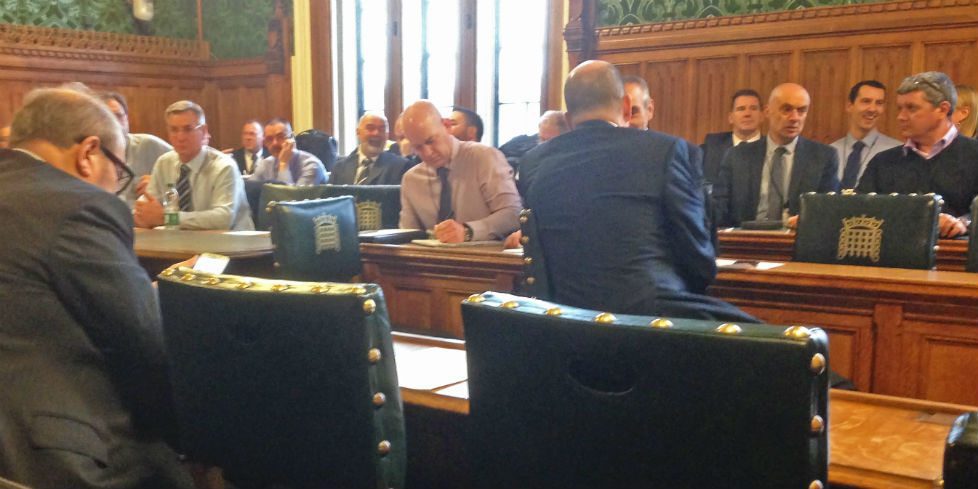Sale Engineering Products’ MD and owner, Rob Bell, had the fortune of being invited to attend the House of Lords for a BAFSA organised event, on 9th February. The event was held to discuss how to better protect our past, present and future from fire, and was sponsored by Lord Howie of Troon and specifically covered heritage assets and schools.
The morning session, which was introduced by Lord Harrison of Chester and chaired by Jim Fitzpatrick MP, focused on the protection of Britain’s heritage sites. Stewart Kidd, ex-BAFSA Secretary General, then took the stage to talk about how heritage/listed buildings are often at higher risk due to their aged construction, frequent unoccupancy, and the focus of fire protection, rightly, being life safety over property. He explained that legislative changes would be very difficult and unpopular, and listed buildings consent issues wouldn’t help. He went to suggest ways of allowing adaptive reconstruction to enable better fire protection, and ways to ensure owners of such properties take their protective responsibilities seriously.
 Steve Emery, of Historic England, then listed a number of heritage properties affected by fire in recent history, the most high-profile of which is probably the 1992 fire at Windsor Castle, although proper statistics don’t exist. Naturally, there are concerns that retro-fitting sprinklers would cause structural and content damage, even if done sympathetically (e.g. high pressure watermist), but this is certainly preferable to the total loss of any building and its contents. However, the costs involved are significant and go beyond the cost of the sprinkler system, such as removal, protection, storage and documentation of contents and specialist removals, this makes retro-fitting financially unfeasible in many cases.
Steve Emery, of Historic England, then listed a number of heritage properties affected by fire in recent history, the most high-profile of which is probably the 1992 fire at Windsor Castle, although proper statistics don’t exist. Naturally, there are concerns that retro-fitting sprinklers would cause structural and content damage, even if done sympathetically (e.g. high pressure watermist), but this is certainly preferable to the total loss of any building and its contents. However, the costs involved are significant and go beyond the cost of the sprinkler system, such as removal, protection, storage and documentation of contents and specialist removals, this makes retro-fitting financially unfeasible in many cases.
Bob Bantock, of National Trust England, proceeded by discussing the lessons learned from the total loss of Clandon Park in 2015. The property was compartmented from basement to ceiling, but an avoidable electrical fault in the basement quickly spread upwards and across the roof cavity. Despite fast response from the fire service, who did manage to the recover some of the key contents, the building was totally destroyed and must now be rebuilt. As well as re-visiting risk assessments, the National Trust are trialling various mitigations such as thermal imaging of electrical components and Thermarestor heat detectors, as well as pushing for a more defined fire rating system for electrical cabinets. After which Ged Phelan, of Merseyside Fire & Rescue, raised his concerns in current fire service training, which was not unanimously agreed with, making particular reference to a lack of specialist training, attributing this to ongoing government funding cuts.
Before lunch there was the presentation of the Bernadette Hartley Memorial Award for contributions to the cause of sprinklers. The rather unsurprising but thoroughly deserving winner was Stewart Kidd, who recently retired from BAFSA after over 15 years of service as Secretary General.
After a sumptuous lunch overlooking the Thames, on an unexpectedly sunny afternoon, the afternoon session was introduced by Margaret Ferrier MP. The session focused on sprinklers in schools and was chaired by Lord Brookman of Ebbw Vale, who attended the 1966 Aberfan disaster and is understandably very passionate about school safety. Danny Doherty, of BAFSA Scotland, continued by summarising Scotland’s legislation for sprinklers in schools and how it arose from BRE’s 2004 report on their effectiveness in residential premises.
He went on to discuss the impacts of a serious fire on a school, which goes way beyond life safety and financial cost, referring to the long-term disruption of pupils, parents and teachers and the loss of records and pupil work. He informed the room that in the past 2-3 years there have been at least 12 major incidents, luckily not resulting in loss of life. Raising the question as to why, if everyone agrees that sprinklers save life and property with both Scotland and Wales passing relevant legislation, the English government seem so reluctant to legislate in the same ways.
Danny’s case was reinforced by Christine Blower, General Secretary of the National Union of Teachers (NUT), who quoted that there are around 20 fires in schools each week on average, with a third of those within school hours and fire damage costing at least £80 million per year. She then considered the impacts adding severe emotional distress of those closing involved, loss of confidence and, in the case of older school buildings, the real risk of asbestos contamination. NUT’s view is that sprinklers, estimated to cost about the same as carpets, should be mandatory in all new build and refurbished schools.
This was followed by Steve Mills, BAFSA Technical Adviser, who listed some reasons why the issue of sprinklers in schools had made such little progress in England. He suggested that risk assessments are often poor, the loss of local authority control and people in positions of power do not understand the full impact of fire, are the main issues. He then presented a long list of sprinkler saves, as well as examples of where school fires, mainly electrical and arson, have caused extensive damage and disruption for up to two years. Perhaps one of the main issues is the ‘broken market’ where the people who would have to pay for the sprinklers are not those who would benefit.
All in all, at the end of a long day, Rob commented that there were two key messages he had taken from the meeting:
- Britain’s heritage assets, may be the envy of the world, but can never be recreated if lost. He imagines few would disagree that this is collectively a priceless asset but, unfortunately, its protection is not and therefore who is willing to pay for this insurance policy?
- Perhaps we have been lucky that we have not suffered a major life-impacting fire in a British school recently. God forbid it should take such an event in order to crystallise parliamentary thinking into action on this point.

